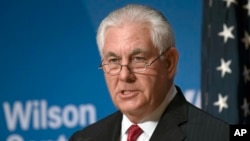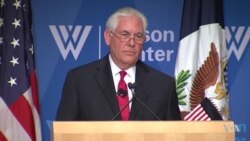U.S. Secretary of State Rex Tillerson said Tuesday the United States and its European allies recognize the "active threat of a recently resurgent Russia" and that the United States “has strengthened its deterrence and defense commitment in Europe” against Moscow.
Tillerson’s remarks came days before he is to embark on a trip to Europe. He is scheduled to meet with foreign ministers from the North Atlantic Council (NAC) and Organization for Security and Cooperation in Europe (OSCE) next week.
In a Europe policy speech, the top U.S. diplomat also said Russia’s aggression in Ukraine is an “enduring obstacle” to improving the frigid bilateral ties between Washington and Moscow.
“We’ll never get this relationship back to normal until we solve Ukraine,” said Tillerson in his address at the Washington-based Woodrow Wilson Center, adding that the conflict in Ukraine must “come to an end.”
“Any resolution of the war that does not entail a fully independent, sovereign, and territorially whole Ukraine, is unacceptable,” said Tillerson, while stopping short of addressing whether the United States will provide Ukraine with lethal defensive weapons.
WATCH: Tillerson speech
Ukraine has been fighting a defensive war in its east for nearly four years, after Russia seized Crimea and Russian-backed separatists invaded eastern Ukraine in 2014. Russian President Vladimir Putin has claimed Moscow intervened in eastern Ukraine to defend Russian speakers. Russia has denied interfering in European politics and elections.
Kurt Volker, the U.S. special envoy for Ukraine negotiations, earlier this year told VOA the argument that lethal arms sales would provoke Russia or embolden Ukraine to attack is “flat out wrong.”
“Russia is already in Ukraine, they are already heavily armed. There are more Russian tanks in there than in western Europe combined. It is a large, large military presence. And, there's an even larger military presence surrounding Ukraine from Russian territory,” said Volker during a July 25 interview with Current Time, a Russian-language network jointly operated by Radio Free Europe/Radio Liberty and VOA.
American Foreign Policy Council Senior Fellow Stephen Blank, who supports U.S. weapon transfers to Ukraine, said arming Ukraine could help “stiffen European and NATO resistance to Russia.”
In a policy brief published by a research group, the Atlantic Council, Blank said Ukraine is the front line of President Putin’s war against the West, and arming Ukraine will make it harder for Moscow to threaten Kyiv by utilizing tools including “terror, propaganda, information warfare, and corruption.”
The Atlantic Council also published a report Tuesday calling for a permanent American military presence in the Balkans to stabilize the Southern European region amid increased Russian efforts to exert political influence. The report, published ahead of a Nov. 29 conference hosting top Balkan officials, calls for a "historic U.S.-Serbian rapprochement" and improved economic prospects for the region's predominantly Muslim youth, specifically via large-scale infrastructure projects aimed at interlinking Balkan nations and improving access to the European mainland.
During Tuesday's speech, Secretary Tillerson cited Moscow’s other destabilizing activities, including intimidating American diplomats, cyber attacks, information warfare, and aiding the regime of Syrian President Bashar al-Assad that uses chemical weapons against his own people.
Tillerson said President Donald Trump’s administration has requested $4.8 billion in its budget toward the so-called European Deterrence Initiative (EDI), which facilitates training and exercises with European allies and improve the readiness of U.S. forces in Europe.
Hours before reports of North Korea's launch of another ballistic missile Tuesday, Tillerson said the U.S. and its European allies are ramping up a diplomatic and economic pressure campaign against North Korea’s nuclear and missile threats.
“In addition to enthusiastically supporting U.N. Security Council resolutions, countries have taken unilateral steps to maximize pressure on the regime in Pyongyang," Tillerson said. "Portugal froze all diplomatic relationship with the DPRK in July. Spain and Italy have expelled North Korean ambassadors. Latvia has fined banks who have violated the sanctions."
Tillerson said North Korea’s aggression is a threat to all nations that required a coordinated response.










